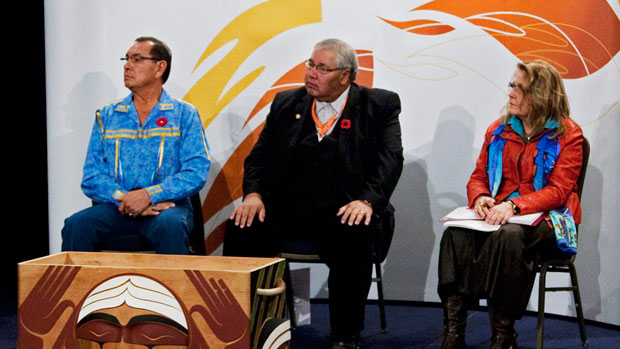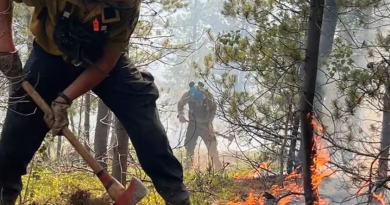Report urges Canada to consider residential school history classes

20 recommendations call for education, mental health support
The residential school system constituted an assault on aboriginal children, families and culture, and Canadians have been denied a full and proper education about aboriginal societies, according to a copy of the Truth and Reconciliation Commission’s interim report obtained by CBC News.
The interim report was leaked Thursday to CBC News, a day before the three commissioners — chair Murray Sinclair, Wilton Littlechild and Marie Wilson — release the report in Vancouver.
Their 20 recommendations address education, health and commemoration, among other issues.
The commission calls for all of Canada’s provinces and territories to develop residential school education materials for public schools. Provinces and territories should hold education campaigns about the history and impact of residential schools in their jurisdictions, the commission says.
The report also asks the federal government to distribute a framed copy of Prime Minister Stephen Harper’s historic formal apology to residential school survivors, saying it should be displayed prominently in every secondary school in the country. The commissioners want the apology delivered to every known residential school survivor.
Wellness facility needed in Arctic
They recommend setting up a mental-health wellness facility in Canada’s North in either the Northwest Territories or the eastern Arctic territory of Nunavut, saying such a centre is “critically needed by residential school survivors and their families and communities.”
The federal government and the churches involved in residential schools should establish what the commission calls “an ongoing cultural revival fund” to pay for projects related to the cultural, traditional and spiritual heritage of Aboriginal peoples in Canada.
The interim report comes as the commission reaches the halfway mark in its five-year mandate. The commissioners are set to deliver their full report when their mandate expires in 2014.
Some other recommendations are:
- Provinces and territories should review what is taught in public schools about residential schools and develop new materials to address any shortfalls.
- The federal government should set up centres for grief and trauma counselling and treatment.
- The concerns of former students who feel unfairly left out of compensation programs should be addressed.
- The federal government should work with the commission to make sure it has adequate funds to complete its mandate on time.
- All levels of government and those party to the settlement agreement should use the United Nations Declaration on the Rights of Indigenous Peoples as a framework for ongoing reconciliation work between aboriginal and non-aboriginal Canadians.
- The federal government should restore funding to the Aboriginal Healing Foundation within the next fiscal year.
- The federal government, churches and other agencies should hand over all relevant documents to the commission so that it can continue its work.
Aboriginal children separated from families
The first residential schools were established in the 1840s and the last one closed in 1996.
Aboriginal children were separated from their families and sent to Christian schools, where many students were abused.
The report says the impacts were immediate and have been ongoing since.
The report insists the commission can’t accomplish reconciliation alone. It says that until the federal government recognizes Aboriginal peoples’ unique legal status as the original peoples of this country, there will be no reconciliation.
Ron Morrisseau is a survivor who went to St. Joseph’s school in Thunder Bay, Ont. He says students need to know more about what happened, but it should come not from teachers but from survivors because they were there.
“The people, man or woman, who went to the residential school should have the privilege of presenting their own consequences. They should be teaching the children, not the government,” Morrisseau said.
For more northern stories from CBC.ca, click here.



